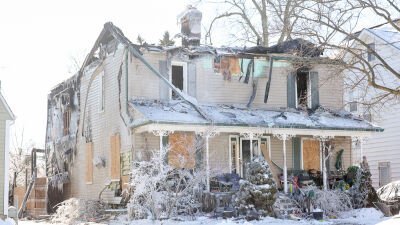
Solutions may be required to combat the health care worker shortages and to increase the number of those studying and entering the field after high school.
Photo provided by David Jones
METRO DETROIT — Statistics across the country are showing a decreasing number of professionals in the health care field, particularly among nurses and general practitioner physicians.
This shortage has some worried that patient care is being negatively affected and that those working in health care are getting stretched thin, even now that the pandemic is over.
“It’s really important to address this problem because, when you have nursing shortages, you have high stress and burnout among nurses,” said professor Suha Kridli, the interim chair of the Oakland University nursing program. “This leads to higher turnover, which leads to even fewer nurses. This all affects patient care. As a patient, you want a nurse that has a healthy workload so they are able to deliver quality patient care.”
Data from the Pew Research Center show that hospitals lost 2.47% of their workforce in 2022 and that hospital turnover increased by 6.4%. The Michigan Health and Hospital Association performed a survey in March 2023 consisting of 95% of the MHHA’s membership that noted there were more than 27,000 current job openings, including nearly 8,500 open nursing positions.
“Staffing shortages continue to impact Michigan hospitals and health systems throughout the state, in both clinical and non-clinical positions, ranging from physicians and nurses to food service and environmental service workers,” said MHHA CEO Brian Peters. “Hospitals and health systems remain committed to solving this crisis and are investing in innovative programs to address and improve the supply of health care workers through education partnerships, offering employees opportunities for higher education and increasing workplace flexibilities.”
Dr. Paolo Marciano, the chief medical officer at Corewell Health in southeast Michigan, confirmed that virtually everyone in the health care field is seeing staffing shortages.
“We are proud of the recruitment and retention efforts we have in place at Corewell Health in southeastern Michigan to combat the looming national physician shortage,” he said in an email. “Our continued retention of medical students, residents and fellows at Corewell Health is critically important to our success. Additionally, we are expanding existing Graduate Medical Education training programs to serve as a pipeline for much-needed specialties. We are working hard to align physician expertise with the needs of the communities we serve.”
Melanie Stosik, McLaren Health Care’s director of provider recruitment, stressed that this is an issue that most in the health care field are dealing with and said that the Detroit area remains an attractive region for employees.
“Though the current and forecasted physician shortage is affecting other regions of Michigan, and efforts are focused in those areas, metro Detroit remains a prominent and favorable market to practice medicine, attracting many physicians and limiting the current risk of a shortage,” she said in an email. “For several reasons, metro Detroit has long been a popular region for physicians to practice and establish their careers. Robust graduate medical education programs at our McLaren Macomb and McLaren Oakland hospitals provide those organizations with direct access to residents and fellows to discuss and offer career opportunities with their respective medical staffs.”
Kridli said that, while there are likely several factors causing this problem, one of the key factors — particularly in the nursing field — is that there are not enough students entering the field to replace those who are retiring.
“It’s not one factor. There is an aging population of nurses. We were not prepared for so many nurses to retire at around the same time. … COVID is part of the retiring trend, in that people reflected on their lives and career choices and were just burned out, but it’s more about not having enough graduating nurses to replace them in the workforce,” she said. “The number of students going into nursing as a career is not sufficient to keep up with the number of those retiring. There is a large decline in the number of high school graduates willing to invest the time and money it takes to go to college. In addition, there is a significant decline in the number of high school students enrolling in college directly after they finish high school. Recently published data indicated that only 54% of 2021 high school grads in Michigan went straight to college. … There is also public skepticism about the value of a college degree. People are now questioning if a degree is worth the cost.”
This is not a local problem.
“It’s nationwide. Just this morning, I received a press release from the American Association of Colleges of Nursing. It said that the number of students in entry-level baccalaureate nursing programs decreased by 1.4% last year. This translates to a drop of 3,519 fewer students from the 2021 and 2022 school year. The decline in student enrollment isn’t just at the entry-level baccalaureate; we are seeing it at all levels,” said Kridli. “Nationwide, at the master’s level, enrollment dropped 9.4%. This is close to 14,000 nursing students. At the Ph.D. level, enrollment dropped by 4.1% (183 nursing students). This translates to a decline in the number of nursing faculty and advanced practice nurses, which means that there are fewer educators to educate and train future nurses.”
Solutions to the issue will likely take time and include growing the number of those entering the health care field from the ground up.
“In my role as an interim dean, I meet with representatives from different health care systems and hospitals. We frequently discuss potential solutions. We think collaboratively and innovatively,” said Kridli. “For example, we recently developed an agreement with Corewell Health, The Corewell Health Nurse Scholars Program, which is a grant from Corewell Health for $20.7 million to increase the number of students in our pre-licensure baccalaureate program. Through our Corewell Health Nurse Scholars Program, nursing students can receive up to $20,000 per recipient of grant funding. This funding is available to Accelerated Second-Degree BSN or Basic BSN students admitted to our School of Nursing. The students would have to commit to work for Corewell Health for two years upon graduation. … We also recently got approved by the Michigan Board of Nursing to expand our program. … We can now accept 99 additional students per year.”
 Publication select ▼
Publication select ▼




























